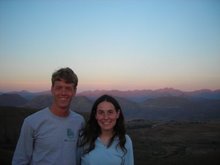As some of you know, I am training to run the Comrades Marathon (a 56 mile race in South Africa) in addition to my research. I have been putting in a lot of runs since I arrived back in August--the race is in May. This weekend I decided to run the last long run of my training and I decided that Maseru was far too tame a venue for this event. I had already done a 50km (31 mile) training run here back in March but decided that a few more hills and another thousand feet of altitude were in order. What was I thinking? Not really sure, but I went for it anyway.
On Friday after a day of research at the university instead of heading for Maseru, I made the drive down to one of the best tourist lodges in Lesotho (and possibly the world, if you are ever here, check it out)...Malealea. I arrived in time for dinner and spent a relaxing evening here. Saturday morning I got up bright and early to (attempt to) conquer the hills. Malealea is at about 6000 feet and I was going up a road toward St. Rodrigue, where I used to teach) that would get up to 6200, drop to 5600 and climb back up to 6200, at which point I would turn around and do it all in reverse. The only hitch in this plan was that I had to carry all my water and I had a touch of the flu last week.
The scenery was amazing for the run, high mountain peaks, the Makhaleng River valley down below (Lesotho's 3rd or 4th biggest river) and a host of scenic villages to pass through (ie an opportunity for 5 or 6 kids to run with me for a couple hundred meters). It was a good run, a beautiful run even until I got to about 35 km (the low-point river crossing on the way home). I was running out of water and my body was telling me that I should have turned around at 21km (making the run a marathon) instead of dragging it out to 25 km, but at that point, what is one to do?
In this case, it meant walking most of the way up the large hill (600 feet of climbing in just over a mile) and then taking turns jogging and walking until I got to just over a full marathon (43km), asking a local high school student who was sitting by the road where the village water tap is, refilling my bottles and taking the shortcut back to the lodge. Sadly the shortcut only cut about 3-4km off the trip and involved going down and up from two different small rivers. So I made it back to the lodge chastened to listen better to my body, especially when I have been sick, but also confident that if I can undergo epic journies like this at altitude then I should be able to get through it when I am down at sea level for race day.
I also managed to talk my way out of a traffic fine (that was largely bogus to begin with) by telling the cops the names of the villages I had run through as I was driving back to Maseru later that afternoon. They thought if anyone was crazy enough to try that and knew the places, they had better let me go, I guess! Stay well.






















